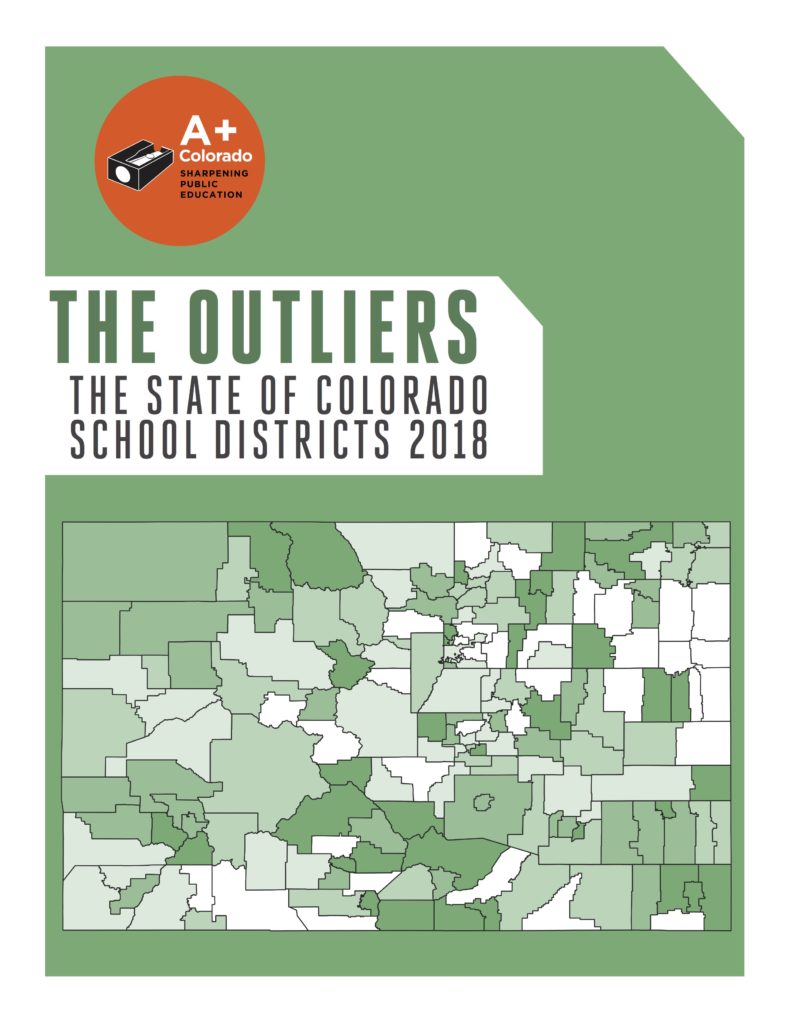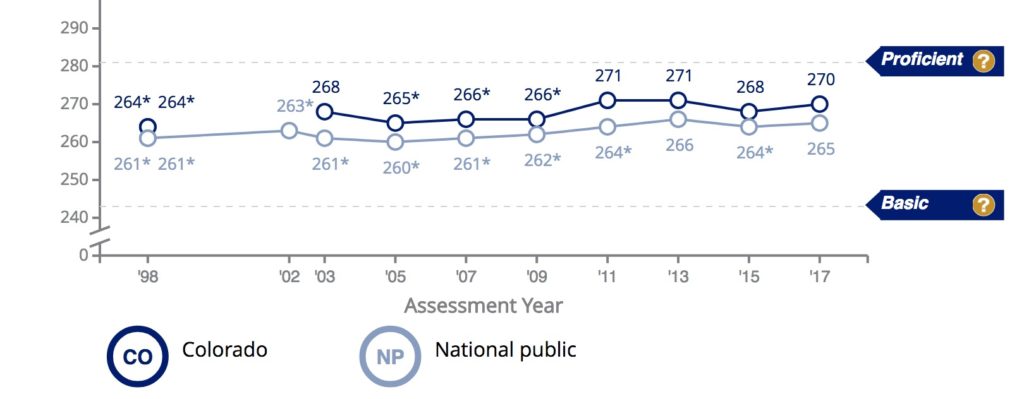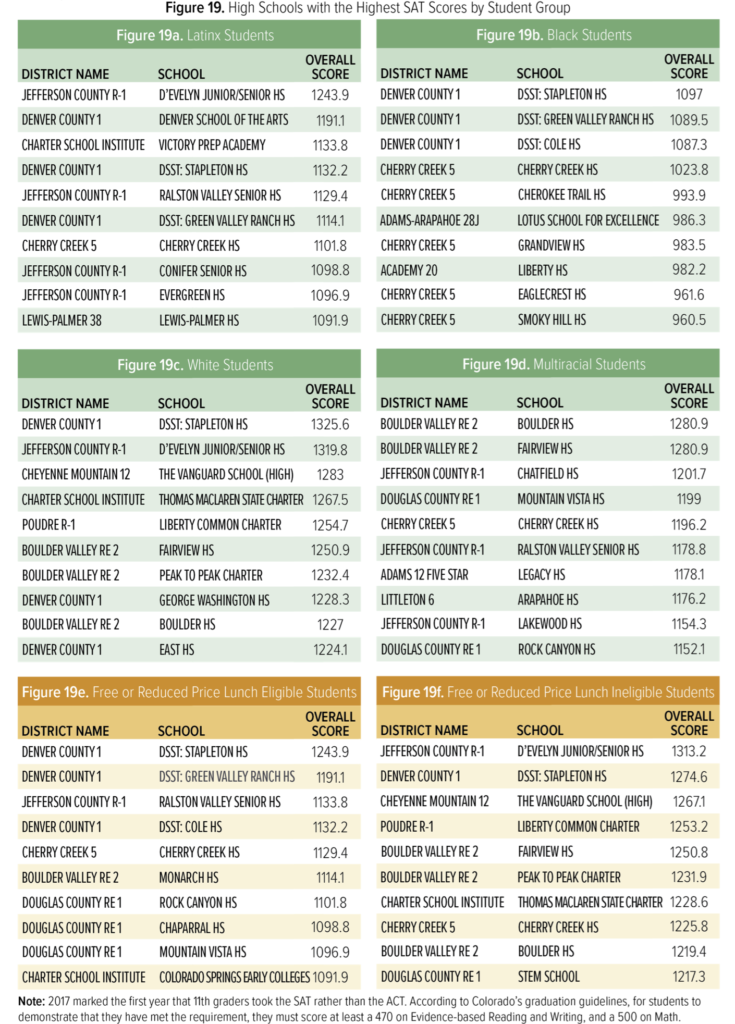 Spring has arrived in dramatic fashion with wild ups and downs each week. The weather has been crazy too. While this legislative session has been relatively low-key on the education front (yes there is the PERA bill and absurd attacks on teacher rights), there has been a great deal of news happening in schools and school districts. We start with our recent report on the state of Colorado school districts and touch on topics from the teacher walkouts, the SPF, NAEP, Adams 14, new Boulder Superintendent and on a Denver high school that has outpaced the state in SAT results for all students.
Spring has arrived in dramatic fashion with wild ups and downs each week. The weather has been crazy too. While this legislative session has been relatively low-key on the education front (yes there is the PERA bill and absurd attacks on teacher rights), there has been a great deal of news happening in schools and school districts. We start with our recent report on the state of Colorado school districts and touch on topics from the teacher walkouts, the SPF, NAEP, Adams 14, new Boulder Superintendent and on a Denver high school that has outpaced the state in SAT results for all students.
A+ Updates
 A+ Colorado released the second annual report The Outliers: The State of Colorado School Districts 2018 last week. The report digs into student performance to uncover the Colorado public school districts that are “outliers,” the districts that buck the trend either by getting notable results for students compared to other school systems in the state, or where the promise of an excellent education remains too distant. This report is critical to better understand where districts are succeeding with students so that we can share lessons and build momentum and capacity for improvement across the state.
A+ Colorado released the second annual report The Outliers: The State of Colorado School Districts 2018 last week. The report digs into student performance to uncover the Colorado public school districts that are “outliers,” the districts that buck the trend either by getting notable results for students compared to other school systems in the state, or where the promise of an excellent education remains too distant. This report is critical to better understand where districts are succeeding with students so that we can share lessons and build momentum and capacity for improvement across the state.
We hosted a thoughtful discussion with several of the “Outlier” district leaders to discuss what is working, what needs to be improved and how these districts will be able to continue to make progress. We were joined by Dr. Walt Cooper– Superintendent, Cheyenne Mountain School District 12, Dr. Susana Cordova — Deputy Superintendent, Denver Public Schools, Dr. Andre Spencer — Superintendent, Harrison School District 2 and Dr. Wendy Wyman — Superintendent, Lake County School District.
Read the full report and let us know what you think!
News to Share
School Performance Framework 2.0?
A+ Colorado recently hosted a series of meetings with David Stewart, the CEO and founder of Tembo to discuss what could be done to improve Denver and Colorado’s SPF to be a more valuable tool for families and the public. There is growing recognition that both Colorado and Denver’s SPFs are ready for version 2.0. The SPF has been a powerful tool for driving improvement in Denver for about a decade (less for Colorado) but it has become less transparent, too complicated and used for far too many purposes making it less useful for the public. It also has some technical challenges because of how indicator scores are rolled up into an overall score that make it harder to distinguish quality among schools. The biggest challenge however is that any average performance score for a school masks how different groups of students do in a school. A+ Colorado would like to see our state have an SPF that has a simple, fair, transparent overall school rating score and then separate scores for how each student group does in that school. We know that some schools can produce great results for some students and not great results for other students. Families and the public should be able to access this information.
Teacher walkouts and funding
Colorado has some of the lowest teacher pay in the country when adjusted for cost of living. This is a growing problem if we expect the best, brightest and most effective to choose education as a profession. We also have some of the nation’s lowest spending on public education adjusted for the state’s wealth. Money does matter, it is obviously not the only factor in driving student achievement but it is essential. We have seen Denver’s schools get better over the last decade (still very far to go) because of a variety of bold improvement efforts and massive increases in funding through a series of bonds and mills. Colorado can not expect to educate most of our children for our current economy let alone the skills and knowledge needed for 2030 without spending more and retooling our 20th century education system. It looks as if this year’s school finance bill HB18-1379 may add an additional 6% on average to the state’s per pupil spending but most districts will need far more to do what is required to provide a “thorough and adequate” public education system as our state constitution requires. We support the teachers that are calling for more funding along with all of the others that are calling for our public schools to be redesigned for the 21st Century.
Colorado NAEP scores flat and Denver’s disappointing

The 2017 NAEP scores came out a few weeks ago with mostly the usual disappointment and spinning by various national advocates that either our policies of the last decade have failed or delivered. Here in Colorado, the results were much are they have been for more than a decade, the same. Colorado’s NAEP results like most states are mostly flat. This is depressing given all of the hoopla about state level policy change but as we have said before the action is in the school districts, given local control in Colorado. If we want our state’s NAEP scores to improve there must be far more effort in school districts to improve. It is no surprise that Denver is one of the only large districts to show improvement relative to the state over the last decade. Speaking of Denver, Denver’s first ever NAEP scores arrived too and they were not good (except for English Language Learners). Denver is in the middle of the pack for urban school systems for most groups of students. Want to read more about NAEP in Denver and Colorado? Read Van Schoales blog digging into the results.
Commerce City-Adams 14 crisis
The crisis in Commerce City’s schools continues with no evidence of improvement and the growing likelihood that there will major pushback and calls for change from the Adams 14 school board. Fuelling the fire recently was a successful vote by three of the five school board members to give Superintendent Abrego a raise and a one year extension on his contract without any community input. Superintendent Abrego was hired in 2016 to turn the district around but has appeared to do little to improve achievement. Yet in 2017, 16% of elementary students in the district met or exceeded grade-level expectations in English Language Arts, and they had a median growth percentile of 44 in the same subject, meaning that most students learned less than their peers across the year. In math, the results looked dire with 13% of elementary students reaching grade-level expectations, and a median growth percentile of 35.5. Superintendent Abrego’s recent moves to eliminate parent teacher conferences, reductions in recess and changes to the bilingual programs have motivated more community members to become involved. A+ Colorado strongly supports the Adams 14 community to better understand the challenges and opportunities to move forward. We have seen many schools and districts throughout Colorado, including two charter schools in Commerce City that do a far better job serving similar students.
Accountability bill
The Colorado legislature continues to discuss HB18-1355 that brings the Accountability system into alignment with current practice, charting a course for state action after districts and schools continue to struggle with low performance after their six years on the clock. A+ issued a statement: we believe that a deeper challenge than the accountability policy structure is a lack of political will to intervene in even the most dramatic circumstances.
School Choice growing in Denver but are there enough quality schools?
Participation in Denver’s school choice system continued to grow this year with an increase of 17% more families submitting applications for the 18-19 school year. Denver is regarded by the Brookings Institution and Thomas B. Fordham Institute as having the most robust school choice system in the country. While it is great news that more families are actively choosing the school that best meets the needs of their students, there remain questions around whether the school choice options for many families are ideal. There remain far too few quality choices in many parts of Denver and the diversity of program types are very limited or non-existent in some parts of Denver. A+ Colorado will be looking more closely into what families are wanting once these data are available. Also look for an A+ Colorado report on the universe of options by education program design and quality to be released in the next month.
New direction in Boulder, a focus on closing gaps?
Boulder has just selected a new superintendent, Rob Anderson who is currently the Deputy Superintendent for Fulton County Schools, a larger more diverse school district in the Atlanta metro area. Though Boulder Valley School District has been a relatively high performing school district for non-low income and white students, it has struggled to support low-income and students of color, with some of the largest opportunity gaps in the state. Rob Anderson has had some success in Georgia raising achievement for low-income students and closing gaps. A+ Colorado wishes him success in this work in Boulder. We encourage his first step to be shedding light on where there are gaps and opportunities. This is all the more important for this new district leadership to tackle, given current state data reporting rules which suppress the data the public would need to know whether Boulder’s black or African American elementary students are reaching the state standards.
Spotlight
DSST: Stapleton H.S. tops the state for SAT performance
Our recently released report, The Outliers 2018, highlighted schools with the top SAT scores for various student groups. One Colorado high school stood above the rest when it came to looking at student performance on the SAT. DSST: Stapleton High School in Denver ranked in the top 10 for highest SAT scores across the state for nearly every student group. Serving students in NE Denver, 53.3% of Stapleton’s students qualify for free or reduced price lunch, 36.3% are English language learners, and 72.4% are non-white students. Within this richly diverse learning environment, DSST: Stapleton H.S. is serving as a proof point for the state that all students, regardless of background, can be served well in a single high school.
A+ in the News
Every student who has graduated from this Colorado high school since 2008 got into college, 9News
The highs and lows of Colorado education are spotlighted in ‘The Outliers’, Chalkbeat Colorado
What’s next for Colorado schools ‘on the clock’? This bill would show the way, Chalkbeat Colorado
Want A+ Colorado news delivered to your inbox? Subscribe!
